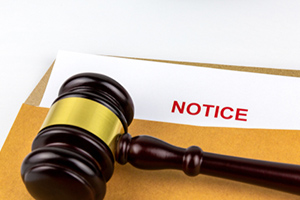Judicial Notice

Judicial notice is a legal doctrine that allows courts to recognize certain facts without the need for formal proof. Judicial notice, governed by California Evidence Code sections 450-460 and Federal Rules of Evidence Rule 201, can play a crucial role in criminal proceedings, affecting the admissibility of evidence and influencing the outcome of a case.
California Evidence Code Sections 450-460Evidence Code Sections 450-452 lay the foundation for the principles of judicial notice, guiding the application of this doctrine within California’s legal system.
Section 451 mandates that a court must take judicial notice of: (1) the decisional, constitutional, and statutory law of the United States and of every state and territory of the United States; and (2) regulations and legislative enactments issued by or under the authority of the United States or any public entity in the United States.
For example, when challenging the constitutionality of the self-defense doctrine used in a voluntary manslaughter case, the prosecution can invoke section 451 to ensure the court acknowledges the relevant state law governing this defense.
Section 452 allows the court to take judicial notice of various facts at its discretion, which include (1) facts and propositions that are not reasonably subject to dispute and are capable of immediate and accurate determination by resort to sources of reasonably indisputable accuracy; and (2) facts and propositions that are reasonably and generally recognized in the United States by the federal government or by the state government.
For example, in a drug possession case, the prosecution can request that the court exercise discretionary judicial notice under section 452 to recognize the molecular structure of a controlled substance, a fact that can be readily determined through reliable sources, such as the Drug Enforcement Administration's guidelines.
Another example is if the prosecution seeks to introduce evidence related to the defendant's mental state at the time of the crime, a defense attorney can challenge the admissibility of this evidence, arguing that the court cannot simply take judicial notice of a defendant's mental state, as it typically requires expert testimony and factual proof.
Federal Rules of Evidence Rule 201In federal criminal cases, Rule 201 governs the application of judicial notice.
Rule 201(a) emphasizes that the federal courts have the authority to take judicial notice of facts.
For example, a criminal defense attorney in a federal drug trafficking case can invoke Rule 201 to establish the legal definition of a controlled substance without the need for extensive evidentiary hearings.
Rule 201(b) mandates that the court must take judicial notice if a party requests it and the court is supplied with the necessary information.
For example, to challenge a wiretap warrant's legality in a federal conspiracy case, a defense attorney may request that the court takes judicial notice of the relevant federal statutes and regulations governing wiretapping.
Rule 201(c) allows the court to take judicial notice at its discretion, even if not requested by a party.
Example: In a federal cybercrime case, the court may choose to exercise its discretion and take judicial notice of the standard cybersecurity practices that pertain to the alleged breach of security.
Rule 201(d) outlines the procedure for requesting judicial notice and the court's response.
Example: In a federal wire fraud trial, the criminal defense attorney may file a request for judicial notice to introduce a federal report on cybersecurity measures to challenge the prosecution’s case.
What Judicial Notice Can and Cannot Be Taken Of in California and FederallyIn California, judicial notice can be taken of facts that are generally known and facts capable of immediate and accurate determination from sources that are reasonably indisputable. The court can also take judicial notice of law and legal determinations. However, it cannot take notice of matters requiring proof, such as disputed facts.
Federal courts can take judicial notice of facts that are generally known or readily verifiable from sources of indisputable accuracy. This may include federal law and regulations. Like in California, federal courts cannot take notice of disputed facts requiring proof, ensuring that parties have an opportunity to present their case fully.
If you are facing charges for a crime, it is critical that you hire an attorney that understands the nuances of judicial notice. As a former Deputy District Attorney with over 14 years of prosecutorial experience, Los Angeles criminal defense attorney Michael Kraut has extensive experience in strategically utilizing this doctrine in an effort to secure justice for his clients.
For more information about the criminal justice process, and to schedule your free consultation, contact Michael Kraut at the Kraut Law Group located at 6255 Sunset Boulevard, Suite 1520, Los Angeles, CA 90028. Mr. Kraut can be reached 24/7 at 888-334-6344 or 323-464-6453.
 Kraut Criminal & DUI Lawyers Home
Kraut Criminal & DUI Lawyers Home















 Los Angeles Criminal Defense Attorney Michael Kraut providing legal defense services for clients in the greater Los Angeles Metropolitan Area, including
Los Angeles Criminal Defense Attorney Michael Kraut providing legal defense services for clients in the greater Los Angeles Metropolitan Area, including